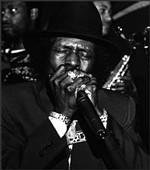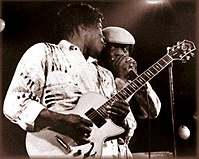|
Born in Memphis, Wells learned his earliest harp licks from another future legend, Little Junior Parker, before he came to Chicago at age 12. In 1950, the teenager passed an impromptu audition for guitarists Louis and David Myers at a house party on the South side, and the Deuces were born. When drummer Fred Below came aboard, they changed their name to the Aces. Little Walter left Muddy Waters in 1952 (in the wake of his hit instrumental, "Juke"), and Wells jumped ship to take his place with Waters. That didn't stop the Aces (who joined forces with Little Walter) from backing Wells on his initial sessions for States Records, though -- his debut date produced some seminal Chicago blues efforts, including his first reading of "Hoodoo Man," a rollicking "Cut That Out," and the blazing instrumentals "Eagle Rock" and "Junior's Wail." More fireworks ensued the next year when he encored for States with a mournful "So All Alone" and the jumping "Lawdy! Lawdy!" (Muddy Waters moonlighted on guitar for the session). Already Wells was exhibiting his tempestuous side -- he was allegedly AWOL from the Army at the time. In 1957, Wells hooked up with producer Mel London, who owned the Chief and Profile logos. The association resulted in many of Wells's most enduring sides, including "I Could Cry" and the rock & rolling "Lovey Dovey Lovely One" in 1957; the grinding national R&B hit "Little by Little" (with Willie Dixon providing vocal harmony) in 1959, and the R&B-laced classic "Messin' with the Kid" in 1960 (sporting Earl Hooker's immaculate guitar work). Wells's harp was de-emphasized during this period on record in favor of his animated vocals.
The harpist made his second appearance on the national R&B lists in 1968 with a funky James Brown-tinged piece, "You're Tuff Enough," for Mercury's feisty Blue Rock logo. Wells had been working in this bag for some time, alarming the purists but delighting R&B fans; his brass-powered 1966 single for Bright Star, "Up in Heah," had previously made a lot of local noise. After a fine mid-'70s set for Delmark (On Tap), little was heard from Wells on vinyl for an extended spell, though he continued to enjoy massive appeal at home (Theresa's was his principal haunt for many a moon) and abroad (whether on his own or in partnership with Guy; they opened for the Rolling Stones on one memorable tour and cut an inconsistent but interesting album for Atco in the early '70s).
|
||
 Amos
Blackmore
Amos
Blackmore With
Bob Koester producing, the harpist cut an all-time
classic LP for Delmark in 1965. Hoodoo Man
Blues vividly captured the feel of a typical
Wells set at Theresa's Lounge, even though it was cut
in a studio. With Buddy Guy (initially billed as
"Friendly Chap" due to his contract with Chess) providing
concise lead guitar, Wells laid down definitive
versions of "Snatch It Back and Hold It," "You Don't Love
Me," and "Chittlin' Con Carne."
With
Bob Koester producing, the harpist cut an all-time
classic LP for Delmark in 1965. Hoodoo Man
Blues vividly captured the feel of a typical
Wells set at Theresa's Lounge, even though it was cut
in a studio. With Buddy Guy (initially billed as
"Friendly Chap" due to his contract with Chess) providing
concise lead guitar, Wells laid down definitive
versions of "Snatch It Back and Hold It," "You Don't Love
Me," and "Chittlin' Con Carne."
 Toward
the end of his career, Wells just didn't seem to be
into recording anymore; a pair of sets for Telarc in the
early '90s were major disappointments, but his last studio
session, 1997's Come on in This House, found
him on the rebound and the critics noticed -- the album won
the W.C. Handy Blues Award for Traditional Blues Album in
1997. Even when he came up short in the studio, Wells
remained a potent live attraction, cutting a familiar
swaggering figure, commanding the attention of everyone in
the room with one menacing yelp or a punctuating blast from
his amplified harmonica. He continued performing until he
was diagnosed with lymphatic cancer in the summer of 1997.
That fall, he suffered a heart attack while undergoing
treatment, sending him into a coma. Wells stayed in the coma
until he passed away on January 15, 1998. A handful of
compilations were released shortly after his death, as was
the film Blues Brothers 2000, which featured a
cameo by Wells. ~ Bill Dahl
Toward
the end of his career, Wells just didn't seem to be
into recording anymore; a pair of sets for Telarc in the
early '90s were major disappointments, but his last studio
session, 1997's Come on in This House, found
him on the rebound and the critics noticed -- the album won
the W.C. Handy Blues Award for Traditional Blues Album in
1997. Even when he came up short in the studio, Wells
remained a potent live attraction, cutting a familiar
swaggering figure, commanding the attention of everyone in
the room with one menacing yelp or a punctuating blast from
his amplified harmonica. He continued performing until he
was diagnosed with lymphatic cancer in the summer of 1997.
That fall, he suffered a heart attack while undergoing
treatment, sending him into a coma. Wells stayed in the coma
until he passed away on January 15, 1998. A handful of
compilations were released shortly after his death, as was
the film Blues Brothers 2000, which featured a
cameo by Wells. ~ Bill Dahl